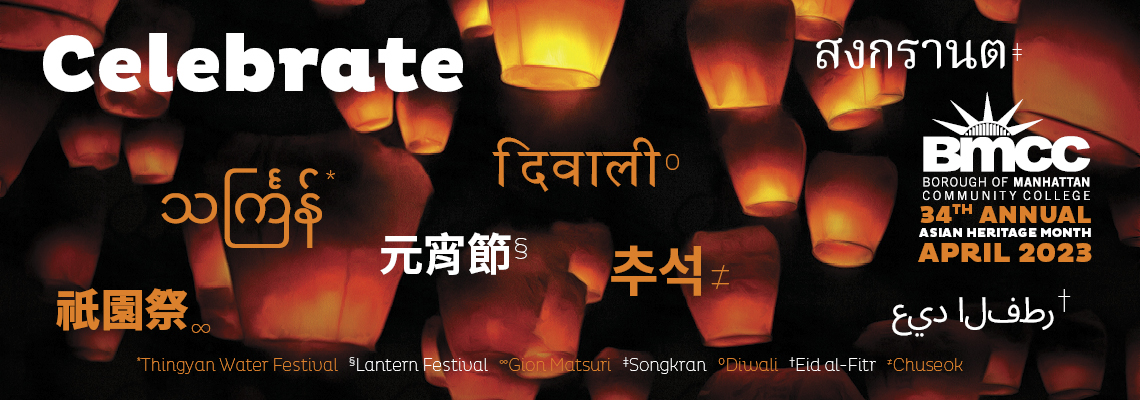
April 10, 2023
Borough of Manhattan Community College (BMCC/CUNY) Professor Alvin Eng authored the memoir, “Our Laundry, Our Town: My Chinese American Life from Flushing to the Downtown Stage and Beyond,” which will be the focus of an Asian Heritage month event, a book talk on April 20.
Looking back over his writing career and creative life, he credits influences including other Asian writers and the experience of his immigrant parents.
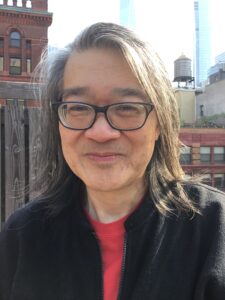
“David Henry Hwang was the first Asian American playwright to win the Tony award for Playwriting, and that was for ‘M. Butterfly’,” says Professor Eng, referring to the Tony Award-winning, Pulitzer Prize-finalist Broadway play from the late eighties.
“I became a playwright because of him. There’s an NYC Asian American media advocacy group called Asian Cinevision, or ACV. They had a literary series that featured a reading with David Henry Hwang. He inspired me back then and he’s been a great inspiration to me since then.”
Professor Eng, who teaches Introduction to Theatre Arts and Fundamentals of Public Speaking in the Speech, Communications and Theatre Arts department at BMCC, joined the college for 10 years starting in 2002, then taught in Baltimore, returning to New York eventually and rejoining the faculty at BMCC. The impetus for his writing and teaching started decades earlier.
A teenager discovers punk and leads a double life
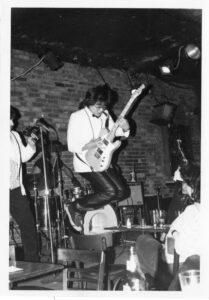
“I always wanted to be a writer, but I was also drawn to live music,” Eng says. “I started in punk rock bands in the eighties, playing guitar and singing, and performed at CBGB and other venues in New York City. We called our band ‘The Grips.’
Around that time, Eng also wrote for “Pulse,” the now-defunct magazine of the now-defunct Tower Records.
“I got to interview Lou Reed, Leonard Cohen and other great musicians,” he says. “I actually started out as a rock journalist while I was still a student at Flushing High School in Queens.”
As he describes it, the teenaged Alvin Eng lived a double life. He was a child of immigrant parents living in Flushing, Queens, which was becoming the city’s second Chinatown. On weekends, he was an intrepid explorer of punk and rock music venues in the Lower East Side of Manhattan and other parts of the city he could reach via subway.
“David Johansen — that was when he had the David Johansen group, after The New York Dolls — let me interview him when I was a kid,” Eng says. “I was at all his shows and that’s how I met him and asked if I could interview him for my high school paper.”
The famous rocker and aspiring teenaged journalist met up backstage, before one of Johansen’s concerts.
“That was the eighties,” Eng says. “Then in the nineties, I was the first Asian American playwright whose work was produced at the Nuyorican Poets Café in the East Village.”
A memoir is born
These experiences, plus working alongside his parents in the laundry business, drive the narrative of Eng’s memoir “Our Laundry, Our Town: My Chinese American Life from Flushing to the Downtown Stage and Beyond.”
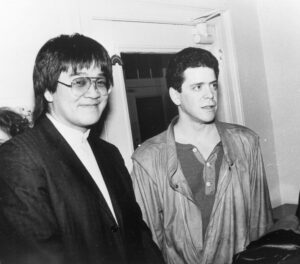
The book’s hardcover edition was published by Fordham University Press in 2022. A paperback edition is set for a September 2023 release.
“When I was growing up in Flushing, only my father spoke English fluently,” Eng says. “My parents had an arranged marriage. My father was an undocumented immigrant, at first finding work in restaurants in Chinatown — but by village standards back in China, he was a rich man and considered quite a catch.”
The Chinese Exclusion Act went into effect in the 1880s, Eng explains. “That made my mother’s move to the United States, illegal. The exclusion act wasn’t repealed till the 1940s, and it was only repealed then, because the U.S. government saw China as an ally against Japan.”
Eng’s parents lived an under-the-radar existence, he says. Their first Chinese hand laundry was in Hoboken, New Jersey, then the family moved to Flushing, Queens.
“My family is Cantonese, not Mandarin,” Eng says. “We’re from the Toisan region, in the Guangdong Province in China. I joke that the Toisanese had a pipeline that ran from Toison to Hong Kong to New York City.”
Small town life thrives, from Shanghai to Queens
“Our Laundry, Our Town: My Chinese American Life from Flushing to the Downtown Stage and Beyond,” Eng’s memoir published by from Fordham University Press, is inspired in part by the 1938 Pulitzer Prize-winning play “Our Town,” by American playwright Thornton Wilder.
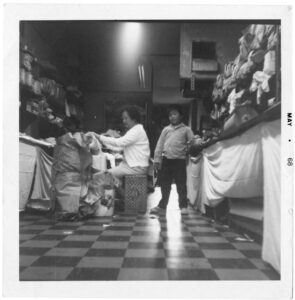
“Wilder’s father was the counsel general to Hong Kong and Shanghai in the early 20th century, and Wilder and his sister lived there for a time,” Eng says. “There are a lot of Chinese influences in the play, even though it’s about a small town in America.”
Eng’s “small town” was Flushing, Queens, as well as the Chinese village where his family originates. The two worlds came together for him in a scholarly project, about ten years ago.
“As a BMCC professor, I held a Fulbright fellowship in Hong Kong in 2011, and travelled there with my wife, theater director and dramaturg Wendy Wasdahl,” Eng says. “We taught ‘Our Town’ to students who were inspired to write their own stories.”
After that, he says, the U.S. Consulate in Guangzhou, a province in China, invited him to perform an “Our Town”-inspired solo piece that he had just written, “The Last Emperor of Flushing,” in his family’s ancestral province, Guangdong.
Asian identity and immigrant rights fuel a creative life
“In the early nineties, after I transferred from Queens College to the MFA program at NYU, I participated in the protest against ‘Miss Saigon,’ a Broadway musical that cast Jonathan Price in a Euro-Asian role,” Eng says. “David Henry Hwang, who had been such an influence to me when I was younger, led the protest and I marched alongside him.”
That protest resulted in NYU making a commitment to recruit more Asian American students, Eng says.
Fast-forward a couple decades, and he is taking part in a 2020 Abolish I.C.E. (U.S. Immigration and Customs Enforcement) protest rally in New York City. Richard Morrison, the director of Fordham University Press was also at the rally, and he and Eng struck up a conversation.
“We were both holding ‘Abolish I.C.E.’ banners, so I knew our hearts were aligned,” Eng says. “I had been out of the publishing world for a while by then, so I asked if he had any pointers for submitting my manuscript of ‘Our Laundry, Out Town,’ and he asked to see it.”
That serendipitous encounter resulted in the memoir being accepted for publication at the respected Fordham University Press.
Students relate to the immigrant experience
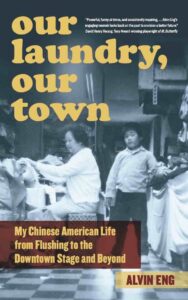
As Eng’s memoir approaches its one-year anniversary and the paperback release is set for September 2023, his most recent piece of writing is making its way into public view.
Inspired somewhat by his puck-rock roots, “Here Comes Johnny Yen Again, (or How I Kicked Punk),” was supported in its early stages through a Lower Manhattan Cultural Council (LMCC) Creative Engagement grant that Eng received in 2022.
He says the impetus for that piece was the opening lyrics to the rock singer Iggy Pop’s song “Lust for Life,” an homage to American writer William S. Burroughs, who died in 1997.
“Growing up, I heard the Iggy Pop song, ‘Johnny Yen,’ and as a Chinese teenager who didn’t always feel like he fitted in, I related to Burroughs’ life story as a misfit, an outlaw who dropped out of Columbia. We were one of the few Asian families in Flushing back then.”
Being the child of immigrants, spending time in his parents’ laundry, striking out to find his voice amid the burgeoning punk rock scene of New York City and growing aware of immigrants’ many stories are all experiences that inform Eng’s writing and add a layer of empathy to his teaching.
In addition to his memoir, “Our Laundry, Our Town: My Chinese American Life from Flushing to the Downtown Stage and Beyond,” and what he refers to as his “acoustic punk raconteur solo show,” “Here Comes Johnny Yen Again (or How I Kicked Punk),” Eng is the author and editor of the oral history and play anthology, “Tokens? The NYC Asian American Experience on Stage.” No Passport Press recently published “Three Trees,” the first of his Portrait Plays series of historical dramas about artists.
“Now that I’m teaching introduction to theater and public speaking courses, I can guide students into discourse around immigrant issues,” Eng says. “They’re interested in the Asian American experience and I’m interested in theirs. Being the son of the outer boroughs, I always related to the CUNY student body — many of them are immigrants, too. We talk about that, and I share how I’ve made it work all these years.”
For information about Asian Heritage Month at BMCC, view the full schedule of events here. Chairs of the 2023 Asian Heritage Month at BMCC are Albert Lee, Erwin Wong and Laura Zan.
Celebrating Asian Heritage Month and the achievements of Asian members of the community supports BMCC’s strategic goals including Strategic Goal #6: Strengthen BMCC’s role in a thriving NYC and as a leading community college, nationally.
STORY HIGHLIGHTS
- BMCC Professor Alvin Eng credits influences including other Asian writers and the experience of his immigrant parents
- These experiences, plus working alongside his parents in their laundry business, drive the narrative of Eng’s memoir “Our Laundry, Our Town: My Chinese American Life from Flushing to the Downtown Stage and Beyond”
- “Now that I’m teaching introduction to theater and public speaking courses, I can guide students into discourse around immigrant issues,” Eng says

